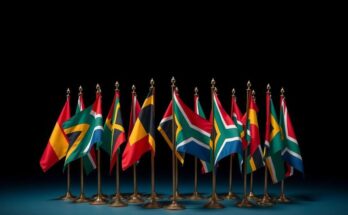Mozambique’s political history illustrates a struggle from civil conflict to attempts at democratic governance, marked by elections and ongoing tensions between Frelimo and Renamo. After significant concessions, both parties engaged in a peace process, but setbacks in governance and electoral integrity resurfaced, warranting cautious optimism about the future state of peace and democracy in Mozambique.
Mozambique’s history, from a prolonged civil war to recent electoral struggles, encapsulates the nation’s tumultuous journey towards stability and democratic governance. The devastating war between the ruling Frelimo party and the opposition Renamo party climaxed with multiparty elections in 1994, marking the end of a grueling conflict that necessitated significant concessions from both sides. Frelimo transformed under Joaquim Chissano’s leadership, moving away from one-party socialism and embracing economic reforms.
Renamo, historically labeled as a pariah, rebranded itself into a legitimate political entity, allowing Afonso Dhlakama to emerge as a presidential candidate amid United Nations’ supervision. Despite Frelimo securing victory, Renamo’s representation indicated a shift in the political landscape. However, remnants of civil strife persisted, as the nation grappled with the impact of land mines, economic challenges, and governance issues amidst natural disasters.
Following significant electoral developments, fragmentation within the political fabric resurfaced, with Renamo’s insurgency and dissatisfaction with electoral integrity spawning tensions. Though a peace agreement was signed in 2014, instability continued, culminating in sporadic violence and electoral irregularities in subsequent elections, including the controversial 2019 and the recent 2024 elections. Allegations of electoral fraud and violence marred the credibility of the electoral processes, further straining relations between Frelimo and Renamo, amplifying fears of political repression.
Mozambique remains at a crossroads, with the struggle for peace interwoven with economic aspirations and a commitment to democratic governance. The ongoing challenges, coupled with regional insurgency and electoral disagreements, necessitate careful monitoring as the nation seeks a path toward lasting stability and prosperity.
Mozambique has traversed a rocky path since gaining independence in 1975, predominantly hauling the scars of a civil war that lasted over a decade. Following the war, the signing of the 1992 Rome peace accord established a fragile peace and initiated a democratic transition in the country. The political landscape has since been dominated by Frelimo, despite the emergence of Renamo as a major opposition force. Furthermore, numerous electoral processes have raised concerns over integrity and fairness, reflecting ongoing struggle between governance and democratic principles. Natural disasters and economic difficulties have further complicated matters, rendering socioeconomic recovery critical to Mozambique’s progress.
In conclusion, Mozambique’s journey from civil strife to potential democratic governance underscores both achievements and challenges inherent in establishing a stable socio-political environment. The recent electoral history highlights ongoing tensions between major political parties and concerns over electoral integrity. The interplay of peace initiatives and economic recovery stands central to Mozambique’s future, as the nation anticipates navigating the complexities of its political landscape, ensuring that the tenets of democracy flourish in harmony with development.
Original Source: www.britannica.com




